Bibliographie
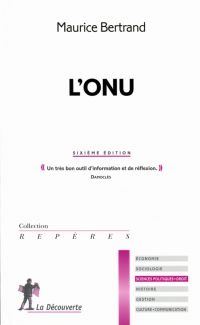
L‘ONU pose avec constance un problème insoluble. Elle incarne le rêve de la paix mondiale, de l’éradication de la pauvreté et de l’ignorance, du respect des droits de l’homme, de la collaboration entre les peuples, mais elle est impuissante à le réaliser. Confondue avec le mythe d’une » communauté internationale « , elle reflète l’incapacité d’établir un consensus à l’échelle planétaire. Son histoire est celle de très nombreux échecs, aussi bien en matière de sécurité que dans les autres domaines. Son Conseil de sécurité n’a empêché aucune guerre et ses opérations de » maintien de la paix » ont conduit à beaucoup plus d’échecs que de succès. Le dialogue entre pays riches et représentants des peuples pauvres se perd en résolutions et déclarations qui ne sont jamais appliquées. D’où une fièvre de réformes qui n’aboutissent pas.
Ce livre explique pourquoi il faudrait aborder ces problèmes autrement.
Auteurs : Maurice Bertrand & Antonio Donini
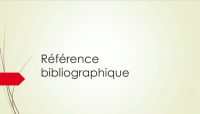
2006
-
Éditeur: La Découverte
-
Collection: Repères N°145
-
Nb de Pages: 128
-
Langue: Français
-
ISBN-10: 2707182876
-
ISBN-13: 978-2707182876
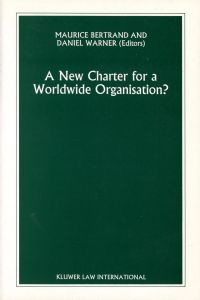
This book is based on a meeting, held in Geneva from 27 February to 1 March 1995, which challenged the fundamental conceptions behind the original United Nations by launching an entirely new Charter, written by Maurice Bertrand, for a worldwide organisation which could replace the UN, the Bretton Woods organisations and the specialised agencies.
The ‘Bertrand Proposal’, the written commentaries which emphasize different aspects of the proposal, and a summary of the discussions are published in this book. The ‘Bertrand Proposal’ is a major contribution to future research and analysis of international organisation and organisations and to the attempts to resolve the present crisis of the international system. The book concludes that since the type of threats against peace, economic security and social development have changed, and the international community has not formulated an adequate response, it is up to a worldwide organisation to try to organise the prevention of crises and conflicts.
Rédigé en collaboration avec Daniel Warner

1997
-
Éditeur: Kluwer Law International
-
Collection: Nijhoff Law Specials
-
Nb de Pages: 250
-
Langue: Anglais
-
ISBN-10: 9041102868
-
ISBN-13: 978-9041102868
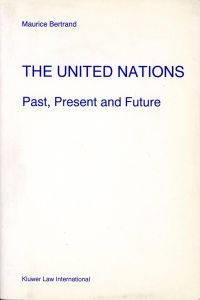
The United Nations is no more than a very modest element in the whole complex body of institutions which forms the structure of international relations. It may, thus appear surprising that this organization should have been, and can still be, the object of such enthusiasm and such hate – of such admiration and such derision – and the most contradictory opinions should daily be expressed on what it does, on its operation and its effectiveness, and on the steps which should be taken for its reform.
It is impossible to understand this paradoxical situation without analyzing the interrelationships between ideas about peace – which were false since the beginning of the League of Nations – the manner in which these ideas have come to be embodied in a structure which prevented the institution from becoming a useful instrument of negotiation, and the accelerating rate of political change in the world, all of which make some suggest that the UN is becoming more and more irrelevant.
Today, the UN touches on everything, but does not in any way give a response to the dream of peace which it was supposed to realize.
Through a thorough analysis of the role of the League of Nations and of the UN in the field of security, an evaluation of their rare successes and their numerous failures, and a complete review of the activities of the organization in the economic and social fields, Maurice Bertrand shows that there is a need today for a radical reform of the whole complex of global organizations.

1997
-
Éditeur: Kluwer Law International
-
Collection: Nijhoff Law Specials
-
Nb de Pages: 190
-
Langue: Anglais
-
ISBN-10: 9041103376
-
ISBN-13: 978-9041103376

Le monde approche t-il de la fin de l’ère militaire ?
Une société post-clausewitzienne est-elle devenue possible?
Questions étranges puisque plus de trente conflits armés sont en cours et que trente millions de soldats servent dans des appareils militaires sophistiqués. Si la fin de la guerre froide n’a entrainé ni changements fondementaux dans la structure des armées, ni rationalisation des politiques militaires, les conceptions de la sécurité sont en train d’évoluer rapidement.

1996
-
Éditeur: Presses de Sciences Po
-
Collection: la bibliothèque du citoyen
-
Nb de Pages: 125
-
Langue: Français
-
ISBN-10: 2724606868
-
ISBN-13: 978-2724606868
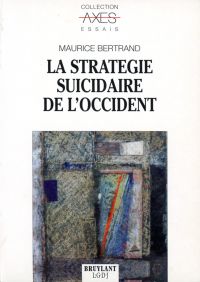
La paix n’est pas ce que vous croyez.
La guerre n’est pas où vous l’imaginez.
Les pays riches, capitalistes ou socialisres ont réussi à établir entre eux des relations pacifiques. La guerre n’est plus l’issue fatale de leurs rivalités.
Mais la paix s’arrête aux frontières du tiers monde. Là, toutes les violences sont permises, toutes les injustices tolérées. L’indifférence des riches n’est troublée que par quelques signaux d’alarme : le terrorisme, les migrations nord-sud, le racisme, la dette des pays pauvres.
L’ONU, faite pour maintenir l’ordre vainqueur de l’après 1945, doit s’adapter pour faire façe aux menaces du monde moderne. Un monde qui a besoin d’un centre de négociation politique. Pas d’une bureaucratie de la charité.

1993
-
Éditeur: Bruylant Bruxelles
-
Collection: Axes
-
Nb de Pages: 212
-
Langue: Français
-
ISBN-10: 2275004874
-
ISBN-13: 978-2275004877
Ce livre n’est plus disponible à la vente, il vous est donc proposé sous la forme d’un fichier PDF en téléchargement libre et gratuit. Les droits sur cet ouvrage restent la propriété de son auteur Maurice Bertrand. Télécharger le PDF
Télécharger le PDF
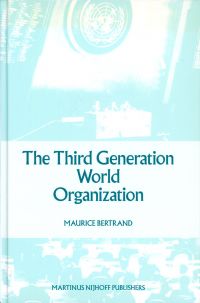
At the end of the eighties, the changes for peace are increasing and international cooperation is growing. But as hopes for peace are on the rise, the United Nations is in decline. This paradox must be explained. This book describes why the search for peace through international organizations has always failed. It sketches a theory of peace and its relationship with the mode of production, which explains why peace exists in the North, but not in the South. It shows that the present United Nations System, including the Bretton Woods organizations, is not equipped for the needs of the modern world, and why it is necessary – and indeed unavoidable – to establish a third generation of world institutions.

1989
-
Éditeur: Martinus Nijhoff Publishers
-
Nb de Pages: 213
-
Langue: Anglais
-
ISBN-10: 0792303822
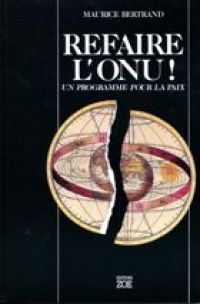
La paix n’est pas ce que vous croyez.
La guerre n’est pas où vous l’imaginez.
Les pays riches, capitalistes ou socialisres ont réussi à établir entre eux des relations pacifiques. La guerre n’est plus l’issue fatale de leurs rivalités.
Mais la paix s’arrête aux frontières du tiers monde. Là, toutes les violences sont permises, toutes les injustices tolérées. L’indifférence des riches n’est troublée que par quelques signaux d’alarme : le terrorisme, les migrations nord-sud, le racisme, la dette des pays pauvres.
L’ONU, faite pour maintenir l’ordre vainqueur de l’après 1945, doit s’adapter pour faire façe aux menaces du monde moderne. Un monde qui a besoin d’un centre de négociation politique. Pas d’une bureaucratie de la charité.

1986
-
Éditeur: Editions Zoe
-
Nb de Pages: 120
-
Langue: Français
-
ISBN-10: 2881820077
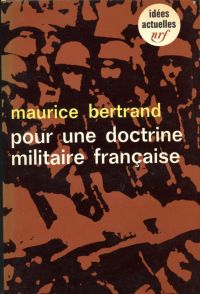
Pour former une armée, faut-il détruire une nation ?
La question n’est pas absurde : le coût de l’armement à l’âge atomique est tel que, pour disposer d’un instrument complet de défense, un pays risque de compromettre définitivement son développement économique et social, ce qui dans le monde moderne signifie cesser d’exister en tant que nation.
Peut-on, en revanche, renoncer à assurer sa sécurité, ou confier sa défense à d’autres que soi ? Comment définir une stratégie de l’indépendance ?
Il s’agit bien là du problème politique fondemmental aujourd’hui pour un pays comme la France. Tout dépend de la solution qui lui sera apportée.
En définitive, à quoi sert une armée et quelle armée la France doit-elle avoir ?

1965
-
Éditeur: Gallimard
-
Collection: Idées Volume 72
-
Nb de Pages: 182
-
Langue: Français
-
ISBN-10: 2070350728
-
ISBN-13: 978-2070350728